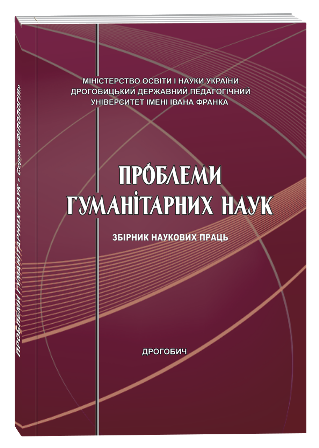SACRED LINGUISTIC SPACE OF THE MONO-IDEOLOGICAL POEM «THE GOSPEL OF EVE» BY MYKOLA SHOSTAK
DOI:
https://doi.org/10.24919/2522-4557.2018.42.150395Keywords:
Mykola Shostak, «The Gospel of Eve», sacred space, theonym, religious vocabularyAbstract
This article analyzes the sacral linguistic space (onymous and appella-tive) of Mykola Shostak’s poem «The Gospel of Eve». It has been found out that the essential elements of the content structure of poems are onyms: theonyms, anthro-ponyms, oikonyms, oronyms. Onym Lord (God) is objectified by the names of the Holy, Creator, Christ, Jesus, Jesus Christ, Teacher, Savior, Rabbi, Heavenly Father, Fa-ther. Theonyms God often becomes the derivative foundation for the derivation of onyms and apologists: Theology, God is inspiration, God is love, God is swaying, God is grateful, God likeness, God is devotion; the godless, the divine. The text of the poem «My Ukraine» is considered as an artistic attempt by the poet to give his new name to Ukraine: from the thirty-fifth maxims – eighteen contain religious vo-cabulary. It is substantiated that the single use of the name Adam and the frequent appeal to Eve in the poetry of Mykola Shostak – the phenomenon is not accidental. The lyrical hero confesses to the Lord, for his sins and for the sins of Adam, but con-stantly justifies the deed of Eve, for she is the one who will bring humanity to life «Of the New Testament», will become a mother, and this is the most important of her vocation, which should release the original sin. The article determines the function of the following onyms Cain, Abel, Herod, Pilate, Barbara, Judas/Judas Iscariot, Moses, Solomon, and Sulamita.
It was investigated that the toponyms in the texts of Mykola Shostak are evi-denced by the oikonyms of Jerusalem Gomorrah and Sodom, the oronyms of Synai, Golgotha, with toponym adjectives Golgotha’s and Babylon’s.
It is indicated that the sacral linguistic and space of the collection «The Gospel of Eve» is versatile and at the level of the appellative vocabulary. The ana-lysis of the vocabulary of the «Cry Cain», united by the concept fields «sacred action» and «sacred place» is made.
In the conceptual field «sacred action», we distinguish lexical and semantic groups in the designation of such biblical actions: to perish to God; to be crucified on the Cross; to demand the crucifixion of Christ; to be a sinner, to sin; to repent, to serve mammon; to get a living from God etc.
The article characterizes conceptual field «sacred place», which heaven is objectified with lexemes sky, paradise, temple, church, one by one – a victorious land, Way of the Cross.
The interpreted material made it possible to draw a conclusion on the deep sacredness of the linguistic space of the mono-ideological poem of Mykola Shostak «The Gospel of Eve».
References
Біда І., Стецик М. Сакральна лексика в новелах Василя Стефаника / Ірина Біда, Марія Стецик // Проблеми гуманітарних наук : збірник наукових праць Дрогобицького державного педагогічного університету імені Івана Франка. Серія «Філологія». – Дро-гобич : Редакційно-видавничий відділ ДДПУ імені Івана Франка, 2016. – Вип. 38. – С. 348–357.
Мацьків П. Концептосфера Бог в українському мовному просторі : моно-графія / Петро Мацьків. – Дрогобич : Коло, 2007. – 332 с.
Топоров В. Святость и святые в русской культуре / В.Н. Топоров. – М. : «Гнозис», Школа «Языки русской культуры», 1995. – Т. 1 : Первый век християнства на Руси. – 875 с. – (Серия: Язык. Семиотика. Культура).
Шелютко В. Проблема сакрального як світоглядна проблема / В.Н. Шелют-ко // Наука. Релігія. Суспільство. – 2010. – № 4. – С. 94–101.



